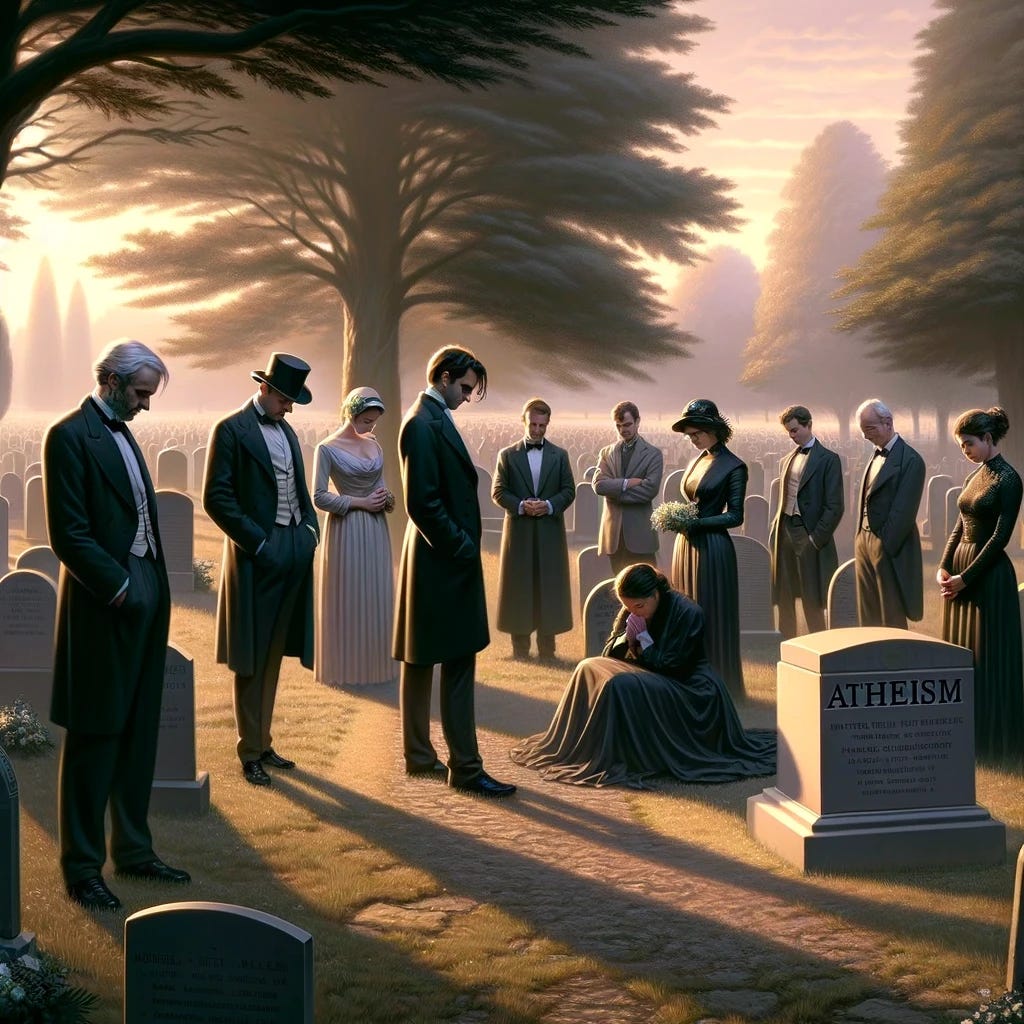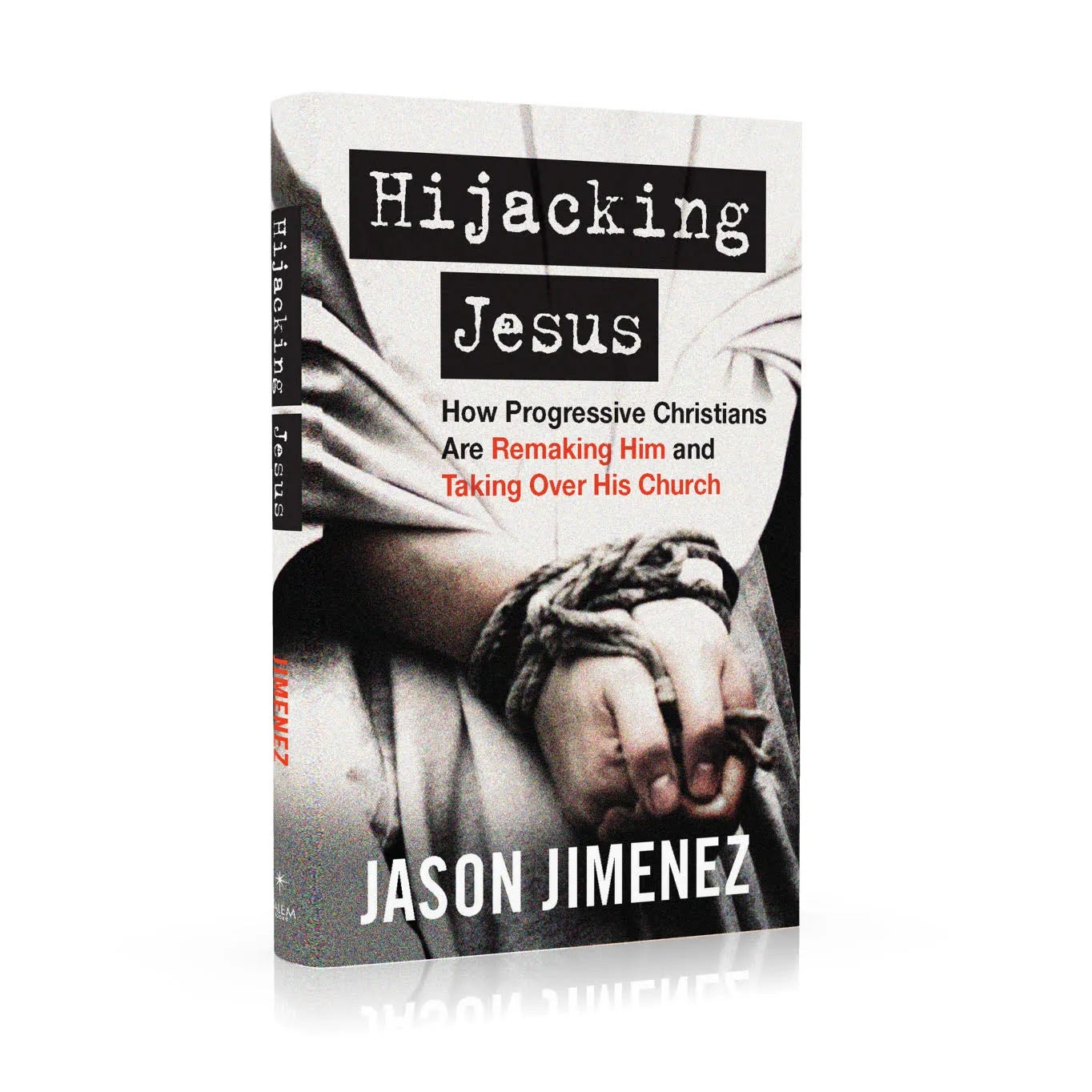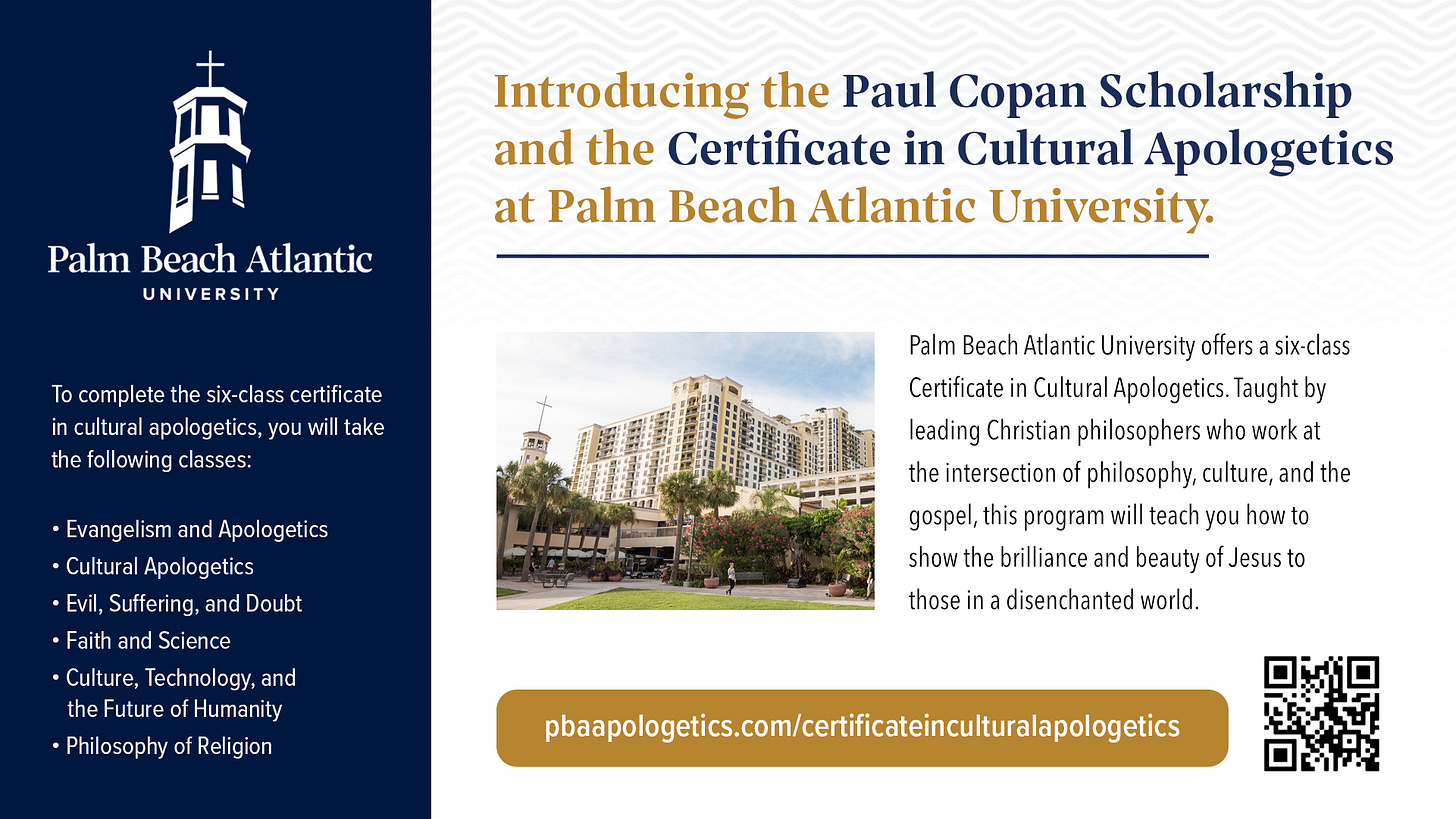Is Atheism Dead?
By Louis Markos
The three-day Martin Luther King weekend—which extended to four days when Houston, somewhat embarrassingly, allowed a mild, ten-degree dip below the freezing point to shut down the city—gave me the time to finally sit down and read Is Atheism Dead? Written in a scholarly-but-breezy, entertaining-but-challenging style by the polymath author and cultural commentator Eric Metaxas, Is Atheism Dead? is, like Lee Strobel’s “Case” books, a synthetic work that draws together powerful arguments from a number of different fields.
As a devourer of apologetics books, I did not expect to learn much that was new from Metaxas’s book, but I could not have been more wrong. The way Metaxas synthesizes his material is quite masterful, compelling the reader to go on a journey with him through recent discoveries in science and archeology that culminates in a fair assessment of the weak and contradictory arguments of the new atheists. This may be a refresher for seasoned apologists, but it is a good one that captures just how far the pendulum has swung since 1966, when the cover of Time magazine asked the provocative question: “Is God Dead?”
More importantly, this is exactly the kind of book that a Christian can give to an agnostic, or even atheist, friend who is serious about examining the evidence for and against God. Is Atheism Dead? moves rather than preaches and engages rather than condemns. It knows how to speak to educated, secular, modern people who have simply gone with the flow, taking for granted, as they have been trained to do, that science has answered all the questions, that the Bible is more mythical than historical, and that religion is a negative force in the world.
Metaxas, whose conversation series Socrates in the City has spoken creatively and effectively to all aspects of the modern world, gently nudges his readers away from these cultural myths to what the science, history, and facts actually teach us about ourselves and our world.
#
Part I of Is Atheism Dead? focuses on the theistic implications of the Big Bang and the fine tuning of the universe. Though these arguments have been made often before, Metaxas draws out the inherent drama in the scientific discoveries that have forced even atheist scientists to abandon the myth that our universe has always been here and that there is unlimited time for evolution to work. He even injects a humorous but indisputably logical dig at those who would use evolution to explain how life first appeared on our planet (abiogenesis).
“Can it be that everyone has been trained to nod in agreement at the concept of evolution, so that if we sneak it into this conversation on abiogenesis we can pretend that evolution extends everywhere, including into the world before life? The term ‘evolution’ is often used sloppily, as when someone talks of the universe ‘evolving,’ as though the lifeless rocks and balls of flaming gas and galaxies were somehow alive. But most people know the term ‘evolving universe’ is meant metaphorically. But anyone using the word ‘evolution’ in defining ‘abiogenesis’ is certainly not being metaphorical. On the contrary, they are deftly—and it appears dishonestly—implying that whatever magical process happens after we have life can somehow happen before we have life too, as though there is some innate universal principle at work” (115).
This is a strong argument that does more than expose bad science; it reveals, in glaring colors, the rhetorical legerdemain used by atheists to cover over the impossibility of non-life giving birth to life. Indeed, part of the story Metaxas tells is of scientists desperately scrambling to avoid what science, particularly physics, is saying. While the cultural narrative continues to proclaim that there must be life spread throughout the galaxy, the facts forcefully deny it.
Those who already know about the mind-bogglingly precise conditions that had to exist in the milliseconds after the Big Bang, in the calibration of gravity, the electromagnetic force, and the weak and strong nuclear forces, and in the mass and shape of the universe to make life possible will nevertheless learn from Metaxas’s book that more recent discoveries have added immensely to the fine-tuned miracle that is our cosmos. The conditions necessary for life are so extraordinarily rare that they likely have not occurred elsewhere. For example, our earth could not have supported life were it the tiniest bit smaller or larger.
“If Earth were any smaller, our magnetic field would be weaker, and what we call the ‘solar wind’ would quickly strip our atmosphere down to almost nothing, so that we would end up like Mars, which is of course a lifeless world.... But if Earth were any larger… [it] would have more powerful gravity, so that no water or methane or carbon dioxide could escape our atmosphere, which would be so thick we couldn't breathe” (42-43).
The same fine tuning can be found in the astounding fact that the visible light (sunlight) which our planet needs for life represents an infinitesimally narrow fraction of the electromagnetic energy that rays down on us from the sun. How narrow? If we were to compare “the range of the EM (electromagnetic) spectrum emitted by our sun” to “a deck of playing cards that stretches beyond our atmosphere and all the way to the next galaxy,” visible light would represent “about two or three cards in the middle of that deck” (79).
To compound this miracle—and there is no other word for it—the cyanobacteria (blue-green algae) in our oceans could not feed off the energy from the sun if seawater did not allow that energy to pass through it. What is so miraculous about that? “[S]eawater absorbs almost all of the energy from the sun, except for that impossibly tiny part of the spectrum we call sunlight. That it lets pass through. And that sunlight hits the cyanobacteria in the water, and those cyanobacteria just happen to be able to convert that sunlight via photosynthesis into food” (80).
#
Part II of Is Atheism Dead? shifts the focus from the world of science to the world of archeology. Here again, Metaxas uses his storytelling gifts to tell a parallel tale in which the chief weapons of the atheists are seized, repurposed, and used against them. Even as God was being rendered unnecessary for the creation of the cosmos and of human life, so was his word, the Bible, being dismissed as a book of legends with no grounding in history. And then the archeologists began to ply their shovels and spades.
Before they knew what had hit them, skeptics who thought they had dethroned Genesis forever by ridiculing its frequent mentions of a non-existent people known as the Hittites were forced to acknowledge abundant evidence for the existence, and widespread influence, of just such a people. Then, to make matters worse references to Israel and her kings began to appear on ancient scrolls, obelisks, and steles.
Nearly all readers will know about the Dead Sea Scrolls and how they provided the world with copies of many of the books of the Old Testament from a century or more before Christ. In reply to skeptics who had long claimed that the Bible we read today is filled with errors made accidentally, or on purpose, by generations of scribes, the scrolls proved the accuracy and full reliability of the pre-Gutenberg copiers of the scriptures.
Fewer readers will know that the tunnel Hezekiah built to divert water during the siege of Jerusalem by the Assyrians (see 2 Kings 20:20; 2 Chronicles 32:2-4) was discovered some four centuries ago but only proven to be built by Hezekiah in 1880. Even fewer will know that “an impossibly tiny pair of scrolls made of purest silver” (175) were dug up outside Jerusalem that, in 2004, proved to contain Aaron’s priestly blessing recorded in Numbers 6:24-26. Dated before the destruction of Jerusalem in 586, the scrolls represent the oldest surviving text from the Bible.
What all these discoveries have in common is the support they lend to the historical reliability of the Bible. Even readers who already know about them will enjoy Metaxas’s account, for he unites all three by a clever narrative device: all three were made by “a misbehaving young man between the ages of twelve and fifteen” (151). “Why,” Metaxas asks, “should three boys, all doing things their parents and caretakers would have loudly forbidden, be the ones to open the doors to some of the greatest treasures of the Bible's past? It is either a coincidence or a conundrum. Or perhaps it is something else altogether, to which we may find a clue in the first-century letter written to Christians living in the city of Corinth” (176-177).
Metaxas then quotes 1 Corinthians 1:27-29 about how the God who created the universe and inspired the scriptures delights in using the weak and foolish things of the world to confound the mighty and the wise—including secular critics for whom the Bible is nothing more than a pleasant fable for adults!
#
In the final part of his book, Metaxas takes on the new atheists, showing how out of sync their arguments are with the real scientific and historical facts. More than that, he explodes one of the chief, and loudest, assertions made by all of them, especially Christopher Hitchens. While blaming religion for all the many evils in the world, Hitchens and company blissfully ignore the fact that untold million were slaughtered mercilessly under the atheistic regimes of Hitler, Lenin, Stalin, Mao, Pol Pot, Castro, and others. The death count that can be laid at the feet of Christianity pales to nothing in comparison.
As for new atheist pretensions to moral superiority, they fail utterly to account for fixed, objective standards for goodness, not to mention truth or beauty, in a godless world run by the amoral laws of natural selection. Metaxas particularly takes Richard Dawkins to task for wanting to have his cake and eat it, too. In a 2007 essay titled “The Hubris of Religion,” Dawkins celebrates science as the only true road to truth, and then backs up his paean by listing the great accomplishments of doctors, engineers, and mathematicians. However, Metaxas notes, Dawkins adds to his list the works of Beethoven, Shakespeare, Michelangelo, and Christopher Wren.
Can there be anything more ironically contradictory than the inclusion of these four geniuses on Dawkins’s list? “To any strict materialist and atheist, all music and art and architecture simply do not fit anywhere, any more than do necromancy or astral projection. For any materialist these things are all equally ineffable and therefore outside the bounds of the material world and science. Most of us know their beauty is transcendent and speaks to our souls, but a strict materialist believes neither in transcendent beauty nor in anything else transcendent” (326).
And that, surely, includes the laws of physics that science has discerned in the universe. The scientific method, Metaxas demonstrates, arose in Europe, but not in China or India, because the architects of modern science were Christians who believed the world was created by a balanced, ordered God and that he created our senses with the ability to discover that order. This argument has been made by many other apologists and historians over the last few decades, but Metaxas adds an insight that I have not encountered elsewhere, one that explains why the pre-Christian Greeks and Romans also did not usher in science as we know it.
The Christian “idea that a personal God had created all things was different from the Greek idea that there was an inherent order—a logos—underneath all things. A personal God might choose to do things in a way that was a bit quirkier or more creative and unpredictable than the perfect Platonic idea of a logos. For example, the idea that circles were perfect led the Greeks—Aristotle especially—to be sure that planets must move in circles. But those with a biblical view knew that they must approach creation with humility and were obliged to actually observe how things were, rather than insist what things must be like from some preconceived notions, and of course they discovered that planets orbited in ellipses rather than circles” (352).
Is Atheism Dead? is filled with such incisive insights that lift it above other books that merely synthesize what has been written before. Metaxas has written a book to instruct apologists, guide seekers, and challenge skeptics. And he has done so with his signature style and wit.
— Louis Markos, Professor in English and Scholar in Residence at Houston Christian University, holds the Robert H. Ray Chair in Humanities; his 25 books include Apologetics for the 21st Century, Atheism on Trial, From Plato to Christ, and The Myth Made Fact.
[sponsored]
Do your teens have untapped potential just waiting to be released? At Summit Ministries young adults ages 16-to-22 discover their purpose, gain courage, and deepen their faith alongside like-minded peers. Summit is a life-changing two-week adventure in which top Christian thought leaders walk alongside young adults to teach them, answer their questions, and inspire confidence to stand up and stand out as believers. Apply for this year’s Student Leader Scholarship when you register for an in-person session in Colorado or Georgia. Create an account and select your session today, summit.org/students.
“Summit summer sessions are high-impact, high-energy, immersive experiences that encourage students to think biblically, pursue Christ deeply, and share the love of God passionately. This ministry changes lives. I've taught at Summit for years and watched students come alive as they hear from leading Christian intellectuals with a heart for ministry. This is one of the best gifts you can give to your children as they prepare to be faithful witnesses in our disenchanted age.”
— Paul M. Gould, Associate Professor of Philosophy of Religion and Director of the M.A. Philosophy of Religion program at Palm Beach Atlantic University and regular Summit speaker and teacher for summer and gap-year programs.
Hijacking Jesus
How Progressive Christians Are Remaking Him and Taking Over His Church
Progressive Christian leaders have abandoned the resurrected Savior of historical Christianity, radically reinterpreting Him as a Jewish mystic or a man of God devoid of divine claims and miracles. In the postmodern era, "remaking Jesus" has become a deadly temptation.
The “modern Jesus” of progressives—supposedly friendlier and more accepting than the Savior we know from the Gospels—is gaining popularity and acceptance among self-identified Christians. But they don’t realize that progressive Christianity rejects the biblical revelation of Jesus Christ, the Word made flesh.
Hijacking Jesus addresses perennial questions about the nature of Christ and his teaching, testing the historical and theological accuracy of progressive Christians. Their “Jesus” is simply no match for the reliability of the four Gospels, which are the most credible historical sources for Jesus’s life, teachings, miracles, death, and resurrection. Christians can accept no substitute for the witness of the Gospels and the theological doctrines of the church that Jesus Christ is Lord and Savior.
“Hijacking Jesus is the book I’ve been hoping someone would write! It’s a thorough and accessible intellectual response to progressive Christianity that will become an essential resource for the Body of Christ. Jason Jimenez graciously and truthfully exposes the falsehoods of progressive Christianity and gives wise and practical advice for how to interact with friends and loved ones who have become seduced by its false promises.”
— Alisa Childers, host of the Alisa Childers Podcast, author of Another Gospel? and Live Your Truth and Other Lies
See our recent excerpt from Hijacking Jesus here.
Find Hijacking Jesus at Amazon, Barnes & Noble, and other major booksellers.
Learn more at https://pbaapologetics.com/certificateinculturalapologetics.
"...LIKE GOD?": Post Modern Infatuation With New Age and Neo-Spiritism
“In this thorough and well-researched work, David Sonnesyn brings a lawyer’s mind to the task of exposing and challenging the leading false worldviews of our day. He leaves no heresy unexposed and exposes all of them to the liberating truth of Christianity.”
— Douglas Groothuis, Ph.D., Professor of Philosophy and Apologetics at Denver Seminary, author of Christian Apologetics: A Comprehensive Case for Biblical Faith; Walking Through Twilight: A Wife’s Illness—A Philosopher’s Lament; Philosophy in Seven Sentences; and twelve other books.
Find . . . Like God? at Xulon Press, Amazon, and other major booksellers.
Advertise in The Worldview Bulletin
Do you have a ministry, book, course, conference, or product you’d like to promote to 6,946 Worldview Bulletin readers? Click here to learn how. We’re currently booking for February-March.
Would you like to grow in your knowledge of and ability to defend the Christian worldview?
Would you welcome the opportunity to learn from world-class Christian scholars and apologists?
If so, please consider subscribing to The Worldview Bulletin. You’ll receive exclusive articles, access to our full archive of past essays, the ability to join our video tutorials and presentations, as well as stream them at your convenience.
You’ll also be supporting our work of equipping Christians around the world to contend for the faith and demonstrating the truth, goodness, and beauty of the Christian worldview.
If you prefer to give a one-time donation instead, you can do so here. We couldn’t do this work without the support of our readers.
Thank you!
“Staffed by a very respected and biblically faithful group of Evangelical scholars, The Worldview Bulletin provides all of us with timely, relevant, and Christian-worldview analysis of, and response to, the tough issues of our day. I love these folks and thank God for their work in this effort.”
— JP Moreland, distinguished professor of philosophy, Talbot School of Theology, Biola University, author of Scientism and Secularism: Learning to Respond to a Dangerous Ideology (Crossway)
“I find The Worldview Bulletin very stimulating and would encourage all thinking Christians to read it.”
— John Lennox, emeritus professor of mathematics, University of Oxford, emeritus fellow in mathematics and philosophy of science, Green Templeton College, author of Cosmic Chemistry: Do God and Science Mix? (Lion)
“It has made such a difference to me to realise that my Christian faith is intellectually respectable.” — Duncan Cooke, M.D.
“I just wanted to give a big shout out to you for creating this awesome newsletter. . . . I read it regularly with great joy and gain, not least because the articles manage to be intellectually thorough whilst spiritually stimulating. And my standards are high, being a professional philosopher.”
— Alin C., Lausanne, Switzerland
“The Worldview Bulletin is a must-have resource for everyone who’s committed to spreading and defending the faith. It’s timely, always relevant, frequently eye-opening, and it never fails to encourage, inspire, and equip.”
— Lee Strobel, New York Times bestselling author of more than forty books and founding director of the Lee Strobel Center for Evangelism and Applied Apologetics
“The Worldview Bulletin is a wonderful resource for the church. It’s timely and helpful.” — Sean McDowell, associate professor in the Christian Apologetics program at Talbot School of Theology and author of The Fate of the Apostles: Examining the Martyrdom Accounts of the Closest Followers of Jesus (Routledge)
“The Worldview Bulletin is a wonderful resource for those desiring to inform themselves in matters of Christian apologetics. Learn key points in succinct articles written by leading scholars and ministers. All for the monthly price of a cup of coffee!”
— Michael Licona, associate professor of theology at Houston Christian University and author of Why Are There Differences in the Gospels? What We Can Learn From Ancient Biography (Oxford University Press)





I have done my studies in apologetics also, as every Christian should, in order to answer the questions in the internet-fed minds of the people around us. Evangelism has changed drastically in the last few decades, and we need to continue to translate the Gospel into something that outsiders can understand. For atheists driven by their assumptions of science (so-called) that means better science. For the anti-Christian, dismissing God, untried and unresearched, Archeology has yet to provide a single item that counters the biblical narrative. Much of the atheistic bravado is a “Weekend at Bernie's” with their dead and dying ideas.